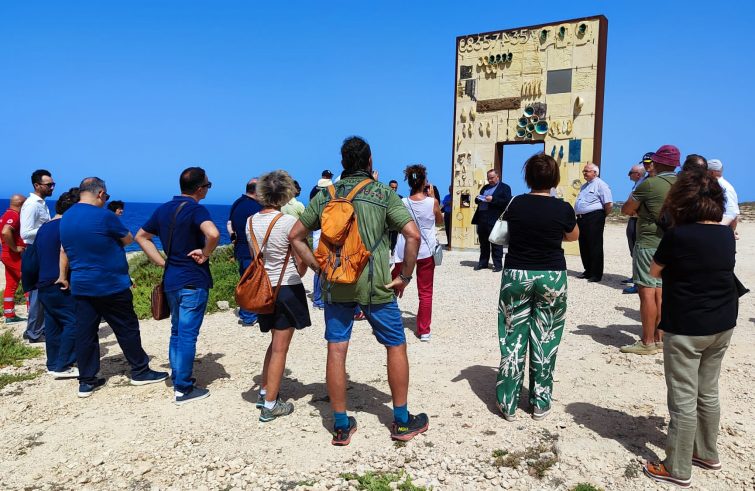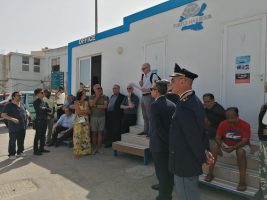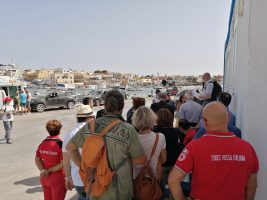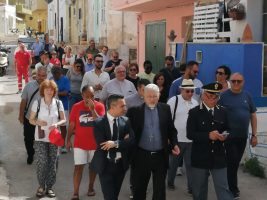
The 2023 National Day of the Sea, promoted by the Apostleship of the Sea of the Italian Bishops’ Conference, the Migrantes Foundation and the Archdiocese of Agrigento, was celebrated on the island of Lampedusa, overlooking the Mediterranean Sea, ten years after Pope Francis’ visit to the island. The title of the event – ‘Has anyone wept? The sea, a place of life’ – echoes the Pope’s words. The high point of the celebrations was a commemorative walk from the cemetery of the parish church of San Gerlando – before God and our consciences as believers – through the port – the island’s real border, but also its gateway and link with the rest of the world – to the so-called Porta d’Europa (Gate of Europe) monument – a symbolic place that recalls the responsibility of society as a whole, including Europe, to take charge of this issue. The route was marked by three different moments of reflection.
The Archbishop of Agrigento, Monsignor Alessandro Damiano, gave the welcoming address outside the church: “May this tenth anniversary be not only a ‘remembrance’ but a ‘memorial’ in the biblical sense of the word,” he said, recalling the need to “remember and revive in our minds, hearts, wills and concrete actions all that Pope Francis told us on this occasion.” For Monsignor Damiano, “only in this way will the salty, brackish waters of the sea not be made saltier and more sour by the tears of those who died there and those who, having survived, mourn their loved ones.”
- (Foto SIR)
- (Foto SIR)
- (Foto SIR)
Facing the port, Fr Bruno Bignami, National Director of the Apostleship of the Sea, said: “Only by listening to the cry of the planet and of the poor will we become more human. It is a necessary condition for being men and women of faith, as the Gospel reminds us: ‘I was a stranger and you welcomed me’. Now is the time to care, to protect life”. For Fr Bignami, “remembering and recovering the value of the sea as a place of life, the purpose of this Day of the Sea, means taking up the Pope’s appeal to welcome human life and promote a culture of the sea as an opportunity for work, encounter and reciprocity. May the Mediterranean Sea cease to be a liquid graveyard and become a common and friendly place for the encounter of diversity,” he added. The Mare Nostrum – “Our Sea” – is a yearning for life on the faces of our brothers and sisters on the shores of the Mediterranean. May selfishness not lead us into the temptation of indifference. May the thirst for transcendence and fraternity – the priest went on to pray with all those present – free us from the evil of ” man-made death.”
“This gateway, like the dockyard of Favarolo, bears witness to a war no less fratricidal than the war in Ukraine and other wars that stain the world with blood, with the difference that here the arsenals are not of weapons but of migrant corpses. When they drown in the Mediterranean or the Aegean, when they die of exhaustion on the Balkan route, of thirst in the Niger desert, of rape and violence in the harsh Libyan detention centres, their bodies are evidence that is not even worth counting, bodies that politicians display like numbers if they remain alive.” Before the Gateway of Europe, the last stage of the journey, Card. Francesco Montenegro, Archbishop Emeritus of Agrigento, who welcomed the Pope ten years ago, said: “During the tragic vicissitudes of migration, this port of ours, once a source of life, has become a port of call for dead bodies, for semi-living beings: an outpost of burials for the former, and the first ‘detention centre’ for the latter, who are immediately considered undocumented migrants. This port – he added – bears witness both to the tragedy of countless deaths and to the human lives that have been saved from the grip of death. Lives saved, nourished, cared for… by health workers, police, volunteers and ordinary citizens, motivated by faith or a sense of duty, certainly by compassion and tenderness, who shelter the migrants first with compassion and then with burial”. For Card. Montenegro, “as in Lampedusa, on the islands of Pithos, Cutro and Lesbos, the name of God was drowned with the names of His sons and daughters, and so was civilisation. In the name of God who is Mercy,” he concluded, “may the Mediterranean once again become a fertile ground for exchanges, a seedbed of culture, faith and civilisation.















